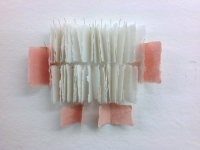We have been reading and discussing Elizabeth C. Miller’s (2011) article Sustainable Socialism: William Morris on Waste, The Journal of Modern Craft, 4:1, 7-2. This is a fascinating article exploring William’s Morris ideas and comments on waste. Morris was remarkably prescient, with his ideas as relevant as ever in this time of ecological crisis.
Miller highlights how:
Struggling with the problems of overproduction and superabundance that characterize capitalism, Morris pinpoints capitalism’s ideological reliance on a faulty conception of waste, wherein material goods are imagined to be capable of disappearing without consequence (p.10).
in Morris’s own words,
“the very essence of competitive commerce is waste.”
Morris’s socialism was predicated on a balanced distribution of goods. Unequal societies are characterised by overabundance for some juxtaposed with want for many. For Morris, ‘inequality and wastefulness go hand in hand’. Want is an issue of distribution not scarcity.
Morris imagines a utopian future society in his book News from Nowhere.
Morris argues for careful making, more equal distribution and ‘fighting envionmental degragation and overproduction by thoroughly internalizing the values of craft, durability and preservation'(Miller 2011 p. 18). These ideas were central values of his Kelmscott Press. The Press produced high cost books, somewhat at odds, some would argue, with his socialist principles. However, Morris also produced ‘penny pamphlets’ to share ideas at a reasonable price.
We are drawing inspiration from Morris’s penny pamphlet ideas to develop our own pamphlet! This is a development from Alison’s ‘Little books of lost knowledge’ made using the material from one single-use cup.

My work continues to interrogate and question the relationships with the material world we so often take for granted. In order to make I first have to ‘unmake’, revealing the qualities and the quantity of materials implicit in single use objects. This is a reparative and transformational process, concerned with the ‘disposable’ detritus of everyday life in post-industrial ‘wealthy’ nations. I found the way that Morris discusses issues of wealth and waste in the same sentence as being inspirational in adding to thoughts around the vast quantities of stuff that some see as waste, some see as treasure. What is wealth – material wealth? What is waste – unwanted wealth? Our ethical compass points in the wrong direction, towards recycling, towards making technical solutions and fixing problems that don’t need to be there in the first place.
As artists we hold the world in our hands, a position of privilege which is easily abused, coerced by the allure of a commercialism which is difficult to avoid. By using the material from these single use objects, which otherwise have no obvious destination; their end of life not having been considered by their producers, I am examining and emphasising the seemingly forgotten connections with our material world, and how this has a bearing on our responsibility towards others, the wider biosphere, and ourselves. These humble books have no text, no print; their meaning and message is contained within their materiality, seeking to communicate in a different way. The knowledge that is lost is the ability to live in a sustainable and caring way; knowledge that Morris could see being overtaken by industrialisation and exploitation of people and the natural world. Having visited the William Morris Gallery in Walthamstow and discovered more about his campaigning and political activism in his later years, it seemed appropriate to explore this thinking further and call my next exhibition by the title of this post.
Waste, Want and Overabundance, inspired by Morris’ Socialist ideals, is the title of an exhibition of my work to be held as part of Salisbury International Arts Festival in May/June this year.
See Miller’s article here
References
Miller, E. C., (2011) Sustainable Socialism: William Morris on Waste published in The Journal of Modern Craft, 4:1, 7-2
Morris, W. (1915) Art under Plutocracy,” Collected Works of William Morris vol. XXIII :London: Longmans,180, 1
The University of Maryland (Online)The kelmscott Press https://www.lib.umd.edu/williammorris/kelmscott-press/the-kelmscott-press
The University of Maryland (Online) William Morris; His politics https://www.lib.umd.edu/williammorris/his-politics


